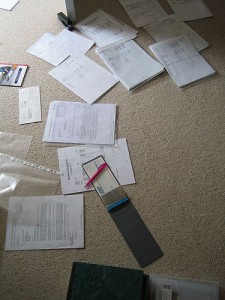 As I consult with nonprofits in California, I have seen a theme emerge: A nonprofit’s accounting system may not have been put together in a thoughtful manner. I don’t mean this as a criticism to the people out there making a difference in their communities who work in nonprofits. I frequently ask in my trainings, “Who started working in the nonprofit sector because you like accounting and filling out reports?” In almost five years only one person (besides me) has ever raised their hand. We go into the sector because we care about the mission, making a difference, building community, or any other number of reasons. Not so we can crunch numbers.
As I consult with nonprofits in California, I have seen a theme emerge: A nonprofit’s accounting system may not have been put together in a thoughtful manner. I don’t mean this as a criticism to the people out there making a difference in their communities who work in nonprofits. I frequently ask in my trainings, “Who started working in the nonprofit sector because you like accounting and filling out reports?” In almost five years only one person (besides me) has ever raised their hand. We go into the sector because we care about the mission, making a difference, building community, or any other number of reasons. Not so we can crunch numbers.
But some people are shocked when they realize just how much regulation, filing and paperwork comes with a tax exempt status. Nonprofits do not always grow their internal capacity, including the finance piece, at the same pace as they expand program and development. That is understandable as those two areas drive most nonprofit funding. But organizations who ignore their accounting systems do so at their own peril because at some point a Board member, a funder, or even the IRS will ask something like, “How much did we spend on this program?” Getting that answer — and the answers to other questions like, “How much did we spend of Funder A’s grant?” or, “What is the total cost of that program, including all of the allocable costs?” — largely depends on how well your accounting system is set up.
If it takes you several days, or even several hours, to get those answers you may need to rethink how you keep your books. The more time it takes to hammer those reports together, the less time you have to do other things like mission and fundraising work. The harder it is to compile good financial information, the greater the likelihood of it not being as accurate as it should be. As has been stated more than a few times, you can’t figure out what you are going to do financially if you don’t know where you stand right now. Good cash flow planning and budgeting can only be done if you have a system in place that can get you usable information in a timely fashion.
This isn’t to say that every nonprofit needs a CPA on staff (although I think it would be great if every nonprofit had a CPA who knows nonprofits on their board), but the person keeping the books should have some familiarity with nonprofit accounting issues. I have worked with more than a few nonprofits who have realized their systems need help, systems that were set up by well meaning folks but that are not able to give them the management information they needed to run the organization. But once a good accounting system is in place and people are trained to use it correctly, it should be relatively worry free.
Steps nonprofits can take to build or repair their accounting system:
Get books. There are many great books on nonprofit accounting, from the short and sweet to the longer and more technical, I’m sure you can find the right one for you.
Get software. Excel is a great tool but you need more. Something that, at a minimum, will track your dollars by account, funder and program.
Get training. You may not need that CPA on staff, but the person working the numbers should know what they are doing with your system. Management support organizations, state associations and other groups have classes to help you.
Get staff. Accounting and finance should not be tacked on to another person’s job if it can be helped. There are a lot of great resources out there to help you find competent staff who, even if they don’t already know nonprofit accounting, can at least be trained on how to operate your system correctly.
Get help. Either to set you up from the beginning or to come in and evaluate where you are, a consultant could be a big help. It might take just a few hours of sitting with someone who knows what they are doing to get you into shape.
Get policies. Once your system is set up and people are trained, document it, map it out and make sure it is followed through any staffing or organizational changes. You don’t want all this hard work to go to waste because of staff turnover.
Get community. Reach out and find other nonprofit finance professionals with whom you can engage, share ideas and get support. There are some great blogs and websites out there.
If you have any other ideas or comments, please post them below. Thanks!
